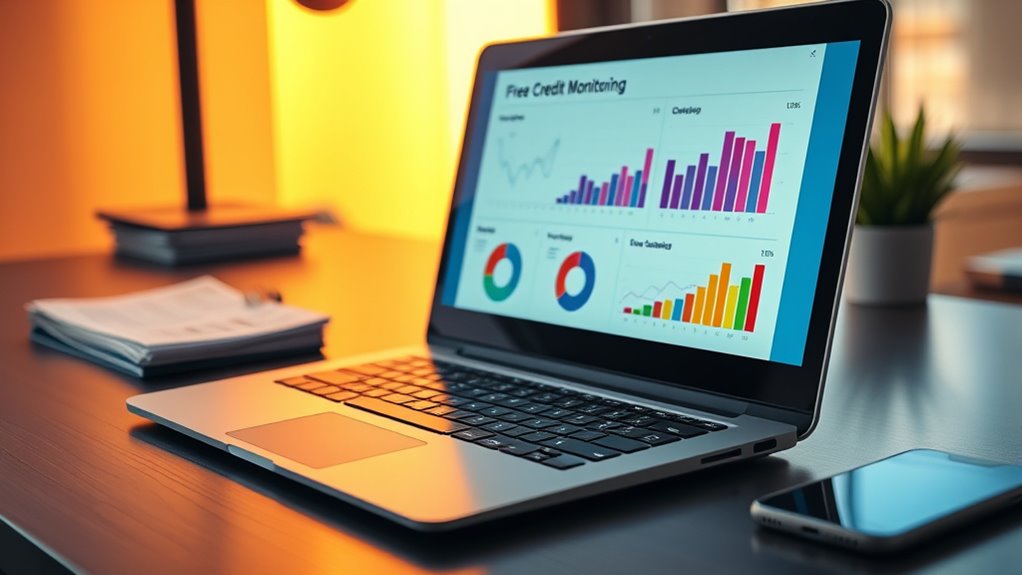When comparing free credit monitoring tools, you’ll find options like Credit Karma, Experian, Credit Sesame, and WalletHub. Each offers different features, such as weekly updates, credit score tracking, and alerts for suspicious activity. Some platforms include extra tools like identity theft protection or dark web monitoring. Keep in mind that updates can be delayed and features vary, so choosing the right service depends on your security priorities. If you continue exploring, you’ll discover important tips to maximize your protection.
Key Takeaways
- Compare features like credit score updates, report access, and alert frequency across platforms such as Credit Karma, Experian, and WalletHub.
- Evaluate each service’s additional security features, including identity theft protection, dark web monitoring, and fraud alerts.
- Consider update delays and limitations on the number of free reports or alerts per year for effective real-time monitoring.
- Review privacy policies and data sharing practices to ensure your information is secure with each tool.
- Match service offerings with your specific needs, such as credit score tracking, dispute assistance, or comprehensive security measures.
Overview of Popular Free Credit Monitoring Services

Many people turn to free credit monitoring services to keep an eye on their credit reports without incurring costs. Popular options include Credit Karma, which offers free weekly updates from TransUnion and Equifax, providing credit scores and alerts. Experian’s free service gives you access to your Experian credit report and score, along with alerts for suspicious activity. Credit Sesame provides free credit monitoring with updates from TransUnion, along with personalized financial tips. WalletHub offers daily credit score updates and free monitoring from TransUnion. While these services don’t charge anything, they vary in the reports and features they provide. Choosing the right one depends on which bureau’s data and features matter most to you, but all aim to help you stay informed about your credit status. Trust issues with credit reports can sometimes arise if updates are not timely or alerts are missed, so understanding how these tools work can help you better protect your financial health. Additionally, some services may include additional features such as identity theft protection or credit score analysis, which can enhance your overall financial security. Regular updates and timely alerts are crucial for maintaining confidence in your credit information and ensuring you can respond quickly to any discrepancies. Moreover, understanding the different reporting agencies involved can help you choose a service that best fits your needs.
Key Features and Benefits of Each Platform

Each free credit monitoring platform offers unique features designed to keep you informed and protected. For example, some platforms provide real-time alerts whenever your credit report is accessed or changes are made, helping you spot suspicious activity immediately. Others include credit score tracking, so you can monitor your score’s progress over time. Many platforms offer educational resources, tips on protecting your identity, and guidance on disputing inaccuracies. Some also provide additional tools like dark web monitoring or identity theft insurance, enhancing your overall security. The main benefit of these features is peace of mind—knowing you’re actively tracking your credit health and being promptly notified of any unusual activity. Overall, each platform’s key features aim to empower you to maintain control over your financial security. Understanding credit monitoring can help you make more informed decisions about which platform best suits your needs, especially considering the importance of privacy and cookie management in protecting your personal data. Furthermore, advancements in AI-driven security are increasingly being integrated into these platforms to detect and respond to potential threats more effectively, providing an extra layer of security measures that adapt to emerging risks. Additionally, familiarizing yourself with credit report details can help you better interpret the information provided by these tools and identify potential issues early on.
Limitations and Considerations When Choosing a Service

While free credit monitoring tools offer valuable insights, it’s important to understand their limitations before choosing a service. First, they often provide only basic information, like credit scores and alerts, but may lack detailed reports. Second, many free tools delay updates, so you might not see real-time changes. Third, some services restrict the number of free alerts or reports you can access annually. Fourth, they might not include identity theft protection or recovery assistance, leaving gaps in security. Additionally, since some tools focus solely on credit monitoring, they may not cover other aspects of financial security, such as fraud detection or account monitoring. Moreover, the use of necessary cookies by some services may affect your browsing experience or data privacy. Incorporating comprehensive security features can greatly enhance your protection. Before selecting a tool, consider whether it meets your specific needs, like monitoring multiple accounts or offering fraud resolution. Being aware of these limitations helps you choose a service that aligns with your security priorities without surprises later.
Frequently Asked Questions
How Often Do Free Credit Monitoring Services Update Credit Report Data?
You might wonder how often free credit monitoring services update your credit report data. Usually, these services refresh your information once a month, but some may do it more frequently or less often. It’s important to check each provider’s specifics because update frequency can vary. Regular updates help you stay informed about your credit status and catch any suspicious activity early, so you can act quickly if needed.
Can Free Tools Prevent Identity Theft or Fraud?
Ever wondered if free tools can truly stop identity theft? While they don’t prevent fraud directly, they’re valuable for alerting you to suspicious activity early. By monitoring your credit reports regularly, you catch potential issues before they escalate. These tools act as early warning systems, helping you respond swiftly. Remember, staying vigilant and practicing good security habits are your best defenses against fraud, even with free monitoring in place.
Are There Differences in Coverage for Different Credit Bureaus?
When comparing credit bureaus, you’ll notice differences in the coverage they offer. Some bureaus provide more detailed reports, including extra credit scores or monitoring services, while others focus on basic information. You should check each bureau’s offerings to see which one best suits your needs. Keep in mind that coverage can vary, so it’s smart to explore multiple bureaus if you want extensive credit monitoring and fraud protection.
What Additional Security Features Come With Free Credit Monitoring?
When exploring free credit monitoring, you’ll find it often includes additional security features to protect your identity. These may include fraud alerts, identity theft insurance, and dark web monitoring. Some services also offer account freeze options or alerts for suspicious activity. While coverage varies, these tools help you stay proactive against potential threats. Keep in mind, not all free services provide the same level of security, so choose one that suits your needs.
Do Free Services Offer Credit Score Improvement Tips or Advice?
Did you know that over 80% of free credit monitoring services focus solely on alerting you to changes, not offering advice? When you use these free tools, you typically won’t find dedicated tips for improving your credit score. Instead, they act as watchguards, alerting you to suspicious activity. If you want personalized credit improvement strategies, you might need to seek out additional resources or paid services.
Conclusion
So, after all this, you might think free credit monitoring is a no-brainer. But remember, these tools are great for peace of mind—until they aren’t. They often come with limitations and hidden gaps, making you wonder if free really means truly protected. Ironically, the best defense might still be staying vigilant yourself. Because in the end, trusting a free service might just be the most expensive gamble you take.









